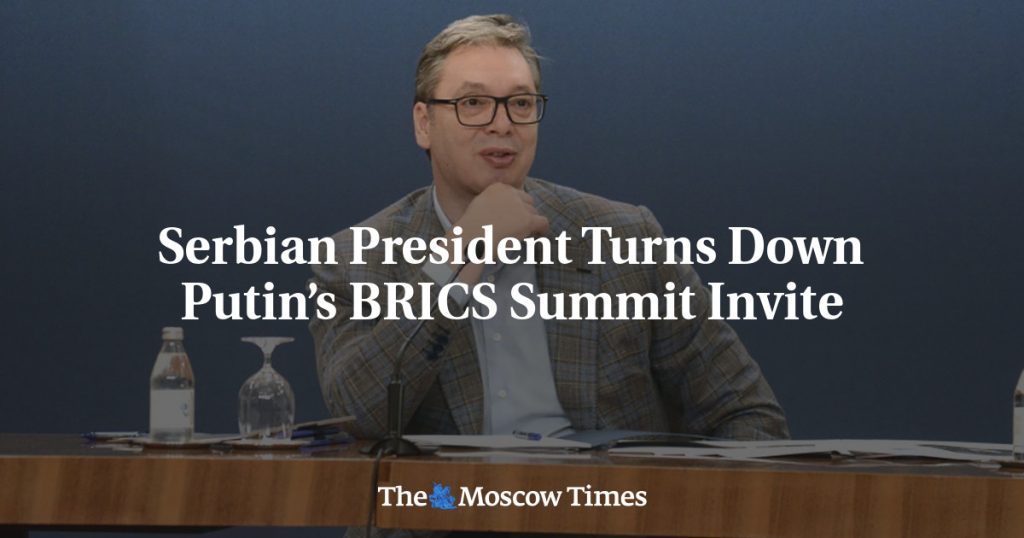Serbian President Aleksandar Vucic has declined Russian President Vladimir Putin’s invitation to attend the upcoming BRICS summit in Russia. Vucic cited the presence of important foreign guests during the same time as the summit in Kazan, Tatarstan, from Oct. 22-24. The BRICS group, comprised of Brazil, Russia, India, China, and South Africa, was originally established in 2009 to bring together the world’s most important emerging economies and serve as a political and economic counterbalance to wealthier Western nations. The group recently expanded to include additional countries like Egypt, Ethiopia, Iran, and the United Arab Emirates.
Putin expressed hope that Vucic would accept the invitation, which had been received approximately two weeks earlier. The Serbian leader had expressed his intent to consider the possibility of attending the BRICS summit. However, Serbia was cautioned by the European Union about maintaining strong ties with Russia. This warning came after Serbian Deputy Prime Minister Aleksandar Vulin referred to Belgrade as an “ally of Russia” during his meeting with Putin at the Eastern Economic Forum in Vladivostok. Serbia has historically close relations with Moscow and is highly dependent on Russian gas. Despite condemning Russia’s invasion of Ukraine at the United Nations, Belgrade has refused to enforce sanctions on the Kremlin.
The decision by Vucic not to attend the BRICS summit underscores the delicate balance between Serbia’s relationship with Russia and its aspirations for Euro-Atlantic integration. Serbia has expressed a desire to join the European Union, but the EU has indicated that maintaining close ties with Russia could hinder Serbia’s path to EU membership. While Serbia has conveyed its commitment to EU integration, its refusal to align with EU sanctions against Russia raises questions about its willingness to comply with EU foreign policy objectives. The issue highlights the challenges faced by countries like Serbia that are navigating between multiple geopolitical alliances.
The BRICS summit provides an opportunity for member countries to discuss issues of mutual interest and cooperate on various economic and political matters. By choosing not to attend the summit, Vucic may be signaling a willingness to prioritize Serbia’s relationships with other partners over its ties with Russia. However, Serbia’s historical connections with Moscow and its economic reliance on Russian resources complicate its foreign policy decisions. The delicate balancing act required to navigate relationships with both Russia and the EU reflects the complexities of Serbia’s geopolitical position in a region that has historically been influenced by competing interests.
At the heart of Serbia’s dilemma is the tension between its historical ties with Russia and its aspirations for closer integration with the EU. While Serbia has expressed a desire to align itself with EU values and standards, its continued closeness to Russia presents a challenge to its European aspirations. The EU’s stance on Serbia’s relations with Russia underscores the need for countries in the Western Balkans to carefully navigate their geopolitical affiliations in order to advance their integration into European and Euro-Atlantic institutions. Ultimately, Serbia’s decision not to attend the BRICS summit highlights the complexities of its foreign policy choices and the challenges it faces in balancing relationships with both Russia and the EU.














